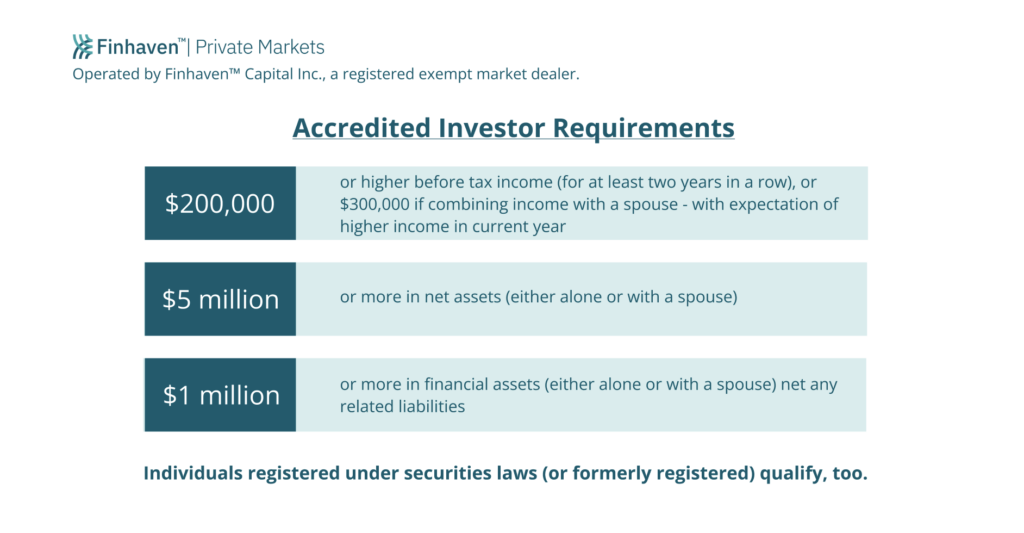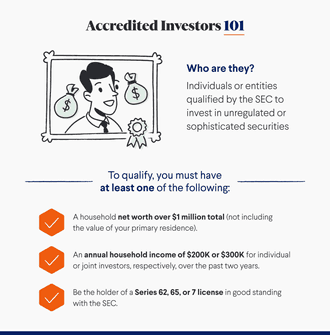All Categories
Featured
Table of Contents
An individual should have a total assets over $1 million, omitting the primary home (separately or with spouse or companion), to qualify as an approved capitalist. Demonstrating enough education or job experience, being a registered broker or financial investment consultant, or having certain professional certifications can likewise qualify a private as a certified investor.
Certified capitalists have accessibility to investments not signed up with the SEC and can include a "spousal equivalent" when establishing credentials. Approved investors might face prospective losses from riskier financial investments and have to confirm financial sophistication to take part in unregulated investments (test to become an accredited investor). Certified capitalist status matters since it figures out eligibility for investment possibilities not offered to the basic public, such as personal placements, endeavor funding, bush funds, and angel investments
Accredited Investor List Free

To participate, accredited investors need to approach the provider of non listed protections, that may need them to complete a survey and provide financial papers, such as tax obligation returns, W-2 forms, and account statements, to validate their status. Rules for accredited capitalists are looked after by the U.S. Securities and Exchange Compensation (SEC), ensuring that they satisfy particular financial and expert standards.
This development of the recognized investor swimming pool is planned to maintain investor protection while providing higher accessibility to non listed investments for those with the required financial sophistication and threat tolerance. - marketing to accredited investors
Licensed Investor
Realty syndication is somewhat comparable to REITs because it additionally involves merging resources to acquire realty investments. A syndication deal is when several capitalists pool their sources with each other to get a solitary realty building. This bargain is created by a syndicator, also referred to as the general sponsor.
These capitalists will provide most of the funding needed to obtain the building (investor certificate). If you believe in the actual estate residential property being syndicated, you can join as one of the passive investors.
These residential properties create consistent capital via monthly rental earnings. In addition, these large homes are typically more challenging to acquire as an only capitalist, which is why submission is an optimal arrangement. Financiers can get involved in multifamily real estate investing with a much lower minimum financial investment. The syndicator will certainly also supervise of building monitoring, meaning passive financiers do not need to fret about becoming a landlord.
Recognized investors do not have to collect rental earnings, offer with renters, handle emergencies, invest cash on fixings, and so on. Either the syndicator will hire a third party building supervisor to do this or they will certainly handle it themselves.
Sometimes the syndicator has a larger portion of the equity. The capital is usually split amongst the participants. This means financiers obtain passive earnings from rents, and the ultimate structure sales. This is based upon what percent of the residential or commercial property they own, depending upon the offer structure.
Become A Accredited Investor

Our point of views are our very own. A recognized investor is an individual or institution that can invest in uncontrolled safeties.
Non listed safety and securities are inherently risky but usually provide greater rates of return. If you have actually ever before come throughout a financial investment offered just to supposed recognized investors, you have actually most likely questioned what the term implied. The label can put on entities ranging from enormous banking organizations and well-off Ton of money 500 firms, completely down to high-earning homes and even individuals.
, granting market accessibility to smaller sized firms that might or else be squashed under the prices accompanying SEC enrollment.
They can additionally gather wealth, purchase actual estate, construct retired life profiles, take threats, and enjoy rewards the biggest difference is in the scale of these endeavors., and angel investing.
For instance, the SEC thinks about hedge funds an extra "adaptable" financial investment technique than something like mutual funds, due to the fact that hedge funds use speculative methods like take advantage of and brief selling. Considering that these complicated products need extra research study and understanding, investors require to show that they understand the dangers involved in these kinds of financial investments prior to the SEC fits with them diving in
While several are primarily familiar with the SEC's customer defense initiatives, the regulatory authority's obligations are really twofold. To guarantee that those 2 initiatives aren't in conflict, it's often essential for the SEC to match up risky, high-reward possibilities with appropriate financiers.
Accredited Investor Income Test
One helps browse the uncontrolled market, and the other will certainly float you to security must the waves threaten. On the other hand, the ordinary financier is secure on the coastline or paddling in the shallows, risk-free under the careful look of the lifeguard (i.e., the SEC). Protections that are readily available to certified financiers are provided via private offerings, which may come with fewer policies than protections provided to more routine investors.
By Percent - January 11, 2021 When it concerns buying supplies and bonds, rather much any individual can invest. As long as you're over the age of 18 (or 21, in some states), not trading on inside details, or otherwise spending as component of a dispute of interest, you can be a component of public markets whether you have $1 or $1 million.
Specific financial investment vehicles consisting of those on Percent are only available to a class of investors legally specified as These financiers have the specific consent from governing bodies based on a narrow collection of criteria to spend in particular kinds of financial investments in exclusive markets. That can be a recognized financier? Better yet, why are certified capitalists a thing in the first area?
The Securities and Exchange Commission (SEC) eventually embraced policy 501 of Policy D, which formalized who can purchase private offerings and specified the term "recognized capitalist" a term that was later upgraded in 2020. An approved capitalist is any individual that satisfies any one of the adhering to standards: Investors with made earnings that surpassed $200,000 (or $300,000 along with a spouse) in each of the prior two years, and anticipates to fulfill the very same criteria in the present year.
Those that are "experienced staff members" of an exclusive fund. SEC- and state-registered investment consultants (however not reporting advisors) of these entities can also currently be taken into consideration certified capitalists.
Accredited Investor Definition 2020

As an example, if you have a total assets of over $1 million (not including your main property/residence), made $200,000+ a year for the last 2 years, or have your Collection 7 certificate, you can make financial investments as a certified financial investments. There are lots of various other qualifications (as you can locate over), and the SEC intend on including extra in the future.
Because the very early 1930s, federal government regulatory authorities have actually found it tough to protect financiers in private offerings and protections while simultaneously maintaining the growth of startups and various other young firms - business that lots of believe are accountable for the majority of work growth in the USA - cryptocurrency accredited investor. Stabilizing this job had actually been leading edge of the mind of the Stocks and Exchange Compensation ("SEC") for many years
Table of Contents
Latest Posts
What Is A Tax Lien Sale
Government Property Tax Sale
Tax Sale Blueprint Cost
More
Latest Posts
What Is A Tax Lien Sale
Government Property Tax Sale
Tax Sale Blueprint Cost